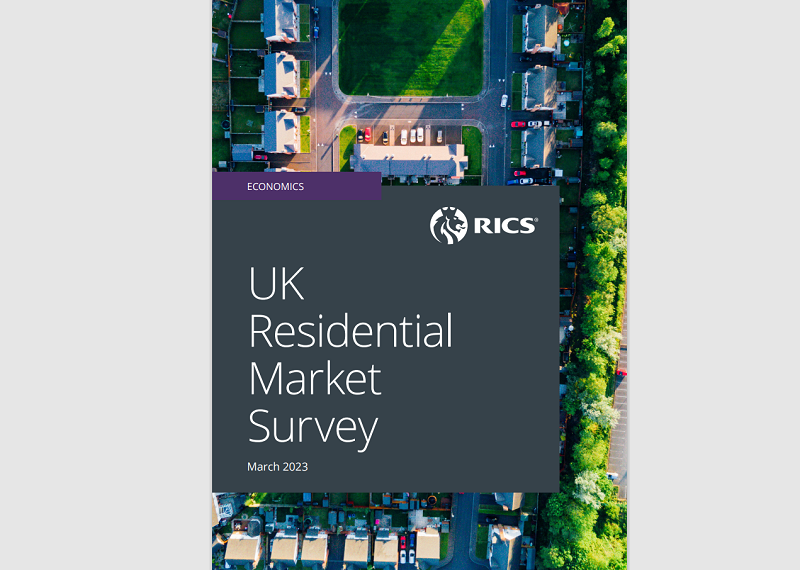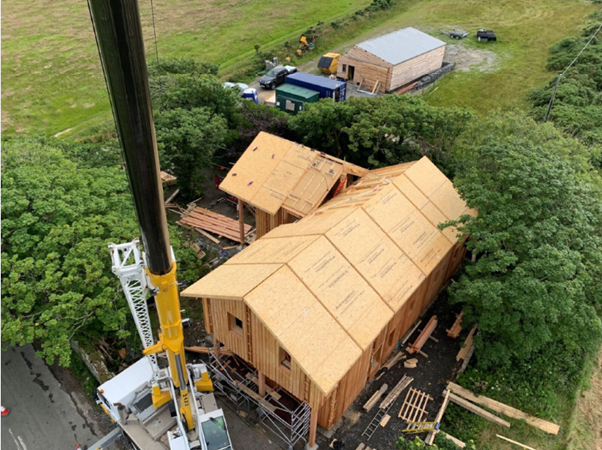The March 2023 RICS UK Residential Survey continues to reflect a generally weak market backdrop, with indicators on demand, sales, new listings, and house prices all negative.
Moreover, near-term expectations suggest this pattern will remain in place for a while longer amid the tighter lending environment. That said, the twelve-month view on sales volumes has improved in the latest feedback, with respondents anticipating a more stable trend emerging.
For new buyer enquiries, a headline net balance of -29% of contributors reported a fall in demand during March (barely changed from a reading of -30% last month). When disaggregated, the downturn in buyer demand remains widespread across the UK, with virtually all regions and the four nations posting a negative reading in the latest returns.

In terms of agreed sales, the national net balance slipped to -31% this month, down from a figure of -25% for February (but still less negative than the recent low of -43% reported in October 2022). Near-term expectations point to sales remaining under pressure over the next few months, returning a net balance of -29%. Nevertheless, this is less downcast than the reading of -45% posted in February. Furthermore, the negativity in near-term sales expectations has diminished to some degree in each of the past three reports. At the twelve-month time horizon, the net balance for sales expectations came in at +1%, representing the first time this measure has been out of negative territory since March 2022.
Concurrently, the supply backdrop remains tight, with the volume of fresh listings coming onto the market falling slightly during March according to respondents (net balance -6% vs -4% previously). Likewise, the number of appraisals undertaken over the month continues to run below the level seen during the same period last year, with the net balance for this indicator sitting at -20% (albeit this is the least depressed reading since August 2022). Meanwhile, the inventory on agents books was little changed over the month. Alongside this, house prices continue to dip, evidenced by a headline net balance of -43% of respondents reporting a decline in the latest results. Although this remains consistent with a clear downward trend in prices, the latest reading is marginally less negative than the figure of -47% seen in previous iteration of the survey. As such, this breaks a sequence of ten consecutive months in which this indicator had deteriorated between April 2022 and February 2023. On a regional comparison, the most significant declines in prices at this point in time are being reported across East Anglia, the South East, the West Midlands and London (in net balance terms).
Going forward, near-term price expectations remain downbeat, returning a net balance reading of -49% compared to -53% last month. Regarding the outlook over the next twelve months, a net balance of -24% of survey participants foresee a further decline in prices over the year ahead (even if this is the least negative reading since September last year). Interestingly, twelve-month price expectations are now broadly flat in London, while contributors based in Northern Ireland, Scotland and Wales envisage a rise in house prices over this timeframe.
In the lettings market, the survey’s tenant demand growth indicator reached a five-month high, posting a net balance of +46% (part of the non-seasonally adjusted monthly dataset). Strong demand is being seen pretty much across the country. At the same time, the landlord instructions metric remains mired in negative territory, returning a net balance of -21% in March.
In keeping with this demand/supply imbalance, respondents continue to anticipate rents being squeezed higher, with the net balance for near-term rent expectations rising to +59% from +45%. This is back towards the highs seen in the early part of last year. For the year ahead, contributors are pencilling in roughly 4% growth in rental prices at the national level. Moreover, all parts of the UK are expected to see an increase in rents during the coming twelve months.
Simon Rubinsohn, RICS Chief Economist, commented: “The overall tone of the feedback received from respondents to the latest RICS Residential Market Survey is still one of caution towards the sales market which is reflected in both the headline price and activity indicators. Deals are being done, but a theme coming through in the anecdotal remarks is the need for vendors to recognise the shift in market dynamics. Significantly, there is also a sense that the medium-term outlook is looking a little more settled, helped by the perception that the interest rate cycle may be near the peak.
“Meanwhile, the rental market remains hugely constrained by the lack of stock. Indeed, the consistency of the message from contributors to the survey about the shortfall of properties to rent and the impact this is having on rent levels is striking. The shifting tax and regulatory environment are highlighted as impacting the viability of many landlords operating in the sector.”




















